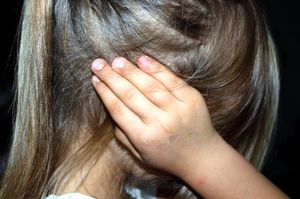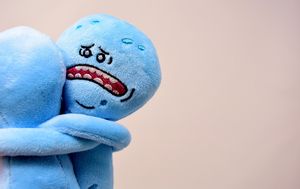As caregivers to children (or even adults) with eczema, many times we get so caught up with our own frustration and helplessness that we forget the immense psychological effects of eczema on these innocent souls, many of whom are robbed of the joy of their lives because of this debilitating condition.
As it is a chronic condition, with causes so wide and varied, and symptoms so unpredictable even in a single individual, getting to the root of the problem can mean years of research and trial and error. Just as you think things seem to be improving, you may find your skin getting inflamed for no apparent reason, and the itch at its worst in a matter of hours.
Or a cream that used to work well in keeping your skin moisturised is now giving you an allergic reaction. This is how frustrating and bizarre eczema can be.
It’s an Ugly Monster
Eczema is bad enough. Topical steroid withdrawal (tsw) makes it a thousand times worse. The bone-deep itch and nerve pain are things that a person who has never experienced it before will never ever understand.
I try to understand it by joining facebook groups, where eczema and tsw warriors describe what they go through, something that young children will never be able to articulate except by scratching, and screaming and crying about pain and itch.
Both my eczema warriors, son J and daughter M, had gone through a period of time when the itch and pain consumed their waking hours, and in fact even in their asleep hours, as they scratched through the night too, sometimes in their sleep, sometimes awaken due to the intense pain and itch, unable to go back to sleep.

For M, at her worst days of tsw, she fussed and cried through the day, inconsolable. She was an agitated and angry toddler, unable to engage in play and learning, being deprived of such a basic human right of a child. Looking back, I can only be thankful that it lasted less than a year.
For J, he itched all day in his preschool, and teachers were very concerned that it affected his learning and ability to focus. Our attempts to get him on a gluten-free diet also saw a drastic change in his personality. As he felt that he no longer had control over what he could eat, he exerted the desire to control elsewhere: he started a secret collection of stationery, and was obsessed about it. Of course that led to another set of problems for us. But again, we are just totally thankful that all these are behind us now.
Self-esteem
J and M are both very sensitive children, and they feel deeply. I’m not sure about the cause-and-effect or whether there is any link at all, between eczema and sensitive feelings, but I will always remember what our homeopathy doctor once said.
She said that people with eczema are generally very sensitive beings, not just emotionally, but also physically. That is why their bodies refuse to take the toxins and other rubbish (chemicals, additives, preservatives, artificial colouring, pesticides, heavy metals, viruses, etc.) that go in, and will protest by presenting the health issues through their skin.
I like this way of looking at things. But it does not make the kids feel any better about themselves. Especially when people stare or point, or make unhelpful remarks. They know how unique they are, without needing reminders.
The least we can do at home is to make it very clear that we accept and love them unconditionally, regardless of how they scratch themselves bloody, regardless of all the skin flakes on the sofa and on the bed, regardless of all the sleepless nights they cause us, we are proud of them because they are the warriors.
Don’t Say “Don’t Scratch!”
Unless we have experienced tsw before, we have no right to tell an eczema or tsw warrior off when they scratch. The itch can be so bone-deep and debilitating that, to put it in a nice way because my own children are reading this, it makes them question the meaning of life. It is truly truly heartbreaking to read about people having you-know-what thoughts.
They did not ask for all these suffering, they are simply the strong and courageous ones.
When we scold them about scratching (which was precisely what I did in the early and inexperienced days of dealing with their incessant itch), it adds to their frustration and helplessness, and has the counter-productive effect of making them itch even more!
At the same time, our reaction makes them feel useless about not having the self-control to stop scratching. This lowers their self-esteem even further. So, what should we do if we cannot ask them to stop scratching?
Swallow your frustration and just hug them
Yes. This is the answer.
I have done this countless times, I know how you can get internal injury from this. When you swallow your frustration instead of letting it out, every single cell in your body screams at you for not getting it out of your system, and you literally feel your own lifespan being shortened.
But at the end of the day, you know you have triumphed over the itchy monster, together with your crying warrior, when the peace sets in upon knowing how supported and cherished you have made your child feel. Instead of acting like another monster that torments your child further, you have actually hugged your child and cried together with him! How many chances do we get to do this in our lifetime?

Emotions are more important than we sometimes remember
In the thick of an itching episode, the child’s emotions are more important than broken and bloody skin. That does not mean we let them scratch to their hearts’ delight. It just means that we really have to watch our reaction: our tone, our words, our body language. These should be supportive and loving, instead of demeaning.
We also teach them to look for ways to cope with each itching episode. For J, it could be applying ice, or aloe vera gel, or some calming cream. Sometimes they work, sometimes they don’t. For M, it could be singing the itchy monster song that chases it away, or placing a piece of tissue paper on her neck to remind her not to scratch, or helping to diffuse the itch by gently tickling her skin with the tip of our fingers.
Each itching frenzy typically lasts 15 to 20 minutes, the most intense kind. It is also the most testing, of our ability to keep our calm and be the strong pillar of support that our loved ones can lean on, or to lose our own self-control and let the worse side of ourselves show.
It certainly is not easy. We are not perfect, sometimes we fall too. When that happens, we just have to pick ourselves up and promise ourselves to do better next time.
And continue to believe that time will heal.

What an stressful experience for all who experience this level of pain and itch and their carers. You have described your experience and expressed this experience on behalf of so many sufferers, and have done your readers and those who can relate proud. I especially like your inclusion of the emotional aspects of those cared for, as this often goes unspoken of and dismissed because so many don’t know how to address feelings. Feelings are very normal responses to one’s world, and by acknowledging those feelings, you help ease the pain ever so slightly with tenderness. Thanks for creating a helpful and supportive post.
Hi Kat,
Thank you for taking the time to read this, your response has touched my heart. I really do hope I am able to ease the pain ever so slightly, for my eczema warriors. And I also hope all the eczema warriors out there can find some emotional support in their lives.
I use to get eczema on my arms and the back of my legs (behind the knees) and even on my back! It put down my confidence and self-esteem. I never wanted to take my shirt off in public and it stopped me from doing the things I wanted to do. I’m happy to say that I don’t have any eczema anymore and I don’t even know how it went away. Maybe it was the soap or my diet, but I’m so happy that it’s gone! Thanks for bringing this subject to light.
Hi Brandon, thank you for dropping by! Yes, eczema can really affect our lives when it rears its ugly head. I’m so happy for you that it has gone away! Stay eczema-free forever!
Simply amazing. For a few moments, I was with you. Your descriptions and actions taken are heartfelt and heartwarming. Your thoughts on the emotions and feelings of the little ones can only come from someone who devotes time and study, not only to this terrible condition but to the individual you are with. Keep the Faith and continue on with this most challenging labor.
Sanders
Hi Sanders,
Thank you for your encouragement, I really appreciate it. Yes, I agree with you, we just have to keep the faith and continue to be the strong pillars of support for the innocent young lives.
This is a powerful and important article! Those who are suffering are dealing with enough without the added issues of those around them judging, demeaning, and becoming impatient with them. I will add, though, that I think if you “swallow your frustration” then “vent” it with a loving hug with the one you’re feeling frustrated with, you’re not going to risk any “internal injury.” With a loving hug, that frustration is chased away. Love conquers all and helps the eczema warriors prevail.
Hi Cheri,
Thank you for your comment, I love your positivity! You’re right, maybe I haven’t been getting any internal injuries afterall… 😉
Such a great article! My hat off to you. I’ve never experienced eczema but I’m happy that I learned so much about it, and the physiological aspect to it. You can’t tell a child to strip scratching when they can’t stop themselves, it’s limited. You made great points at the bottom, we have to retain our frustrations. The chemical reaction we set off in our head sets it off worse for others. I’ll know how to approach things now. Thanks for sharing your story!
Hi Michael,
Thank you for dropping by, your words are an encouragement to keep doing my best for my eczema kids, and to keep sharing our experience with this terrible thing called eczema and topical steroid withdrawal.
I am in my 50s now, and have suffered from eczema since I was a small child. Your description of what your children are going through is spot on. But despite their affliction, your little ones are so blessed by having such compassionate parents.
Thank you for your empathy, for showing us ways to heal ourselves, and for helping others understand what we’re going through.
God bless you for your kindness!
Hi Steely,
I’m really heartened by your kind words. You’ve made my day.
I’m sorry you have had to live with it for all these years. I hope you’re able to find something that can relieve and manage the condition, apart from pharmaceuticals.
The amount of damage eczema can do to a person emotionally, mentally and psychologically is not something everyone is able to see, especially if they had never experienced it or seen their loved ones go through it.
I believe eczema can change and shape a person’s character. And I hope for all the eczema warriors out there, if there’s only one good thing that comes out of this, it is they become stronger and more resilient people, ready to take on any other challenge that life throws at them.
You take good care, Steely, and have a great day.